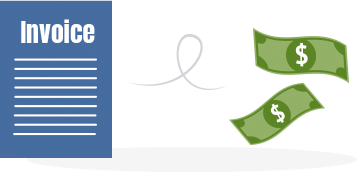Selling an invoice or accounts receivable to obtain immediate cash is called factoring. Essentially, factoring receivables is a method of financing used by businesses to quickly raise capital and improve cash flow so they aren’t held up when there are many things that need to get done every day.
What Is Accounts Receivable Factoring?

Accounts receivable factoring turns invoices and accounts receivable to cash or lines of credit and effectively delegates your bill collection activities elsewhere.
How Does Accounts Receivable Factoring Work?
-
A business sells its invoices at a discount to receive a cash advance within a couple of days instead of waiting 30 to 90 days for a customer to pay the invoice.
-
The invoices are used as collateral in the factoring arrangement. The financing company gives the business an amount equal to a reduced value of the unpaid invoices or receivables.
-
When the invoices or receivables are paid, all amounts advanced, plus the discount and associated fees, go to the finance company and the remainder goes to the business.
This is the process of factoring, and may be repeated as often as needed.
What Types of Companies Can Factor Receivables?
These are just a few of the business types that can benefit from our smart factoring services:
Benefits of
Factoring Receivables

Fill Cash-Flow Gaps
These are gaps that would typically occur between invoicing a customer for goods or services sold and the moment you actually receive payment.

Outsourcing
Outsource the processing management and collections of accounts receivable funding.

Keep Up With Change and Scale
Support seasonal demands, growth, and business opportunities.

Do More Than Ever Before
Grow your business, restructure, take advantage of supplier discounts, hire more employees, and fund payroll.

Don’t Limit Yourself
It has fewer restrictions and is less expensive than equity financing.

Accountability and Risk
Shift the risk of default to the financing company.
Factoring Receivables
With Factor Funding
Factor Funding Offers You and Your Business:
- A customized program that is specific to your needs
- A separate office to process your accounts receivable funding and represent your company
- Experienced and dedicated professionals to process invoice payments, collections, and more
- The financial ability to meet increased demand or take advantage of a business opportunity
- Secure access to account information by phone, email, fax, mail, and online 24/7
- And much more!
For a nominal fee between one and three percent for each invoice funded per month, you can receive all the benefits of factoring with Factor Funding.
Contact Us
For Your Small Business Funding Needs
If you’re ready to see what’s next for your business, fill out the short form below to get in touch with us. We have years of experience in helping companies grow faster by means of smart funding solutions, so let’s strategize together. You’ll be surprised how much it will help you, your employees, and your customers in the long run.
Don’t delay and let your business financing become a headache when there is an easy answer. Your major success boost starts now. You’ll get the foundation you need to propel the company to its next phase. No commitment necessary—just a simple initial consultation, at no cost to you, to get a real feel for Factor Funding and what we can do for you.
Accounts Receivable
Factoring FAQs
It is a method of funding not available through traditional lenders. Accounts receivable financing, factoring, or funding is the sale of invoices at a discount in exchange for fast cash. What are receivables, anyway? They are considered a liquid asset. Receivables are created when a line of credit is extended to customers and reported as assets when it comes to a business’s balance sheet.
It is sometimes known as a ledgered line of credit or invoice financing. Accounts receivable financing can also be referred to as AR factoring or funding.
If you are an established client, it typically takes as little as a few hours and up to two days after invoices are submitted and verified for you to receive funding.
If you are a new applicant, it takes about a week to establish you as a client. This is faster than waiting for a bank loan.
- Account set up
- Preparing your receivables
- Verifying your receivables
- Financing
- Payments and settlement
Checking the quality of your customers’ credit, your receivables aging report, encumbering liens on those receivables, and discovering whether your corporate taxes are current. It may also include background checks on signatories and owners of your business.
Select and submit the customer’s invoices or receivables you wish to sell along with supporting documents, a schedule of accounts, or other recognized request for funding.
Newer invoices are generally more valued than older invoices.
Upon receipt of invoices and receivables, the finance company verifies them with the customer to ensure the invoice amounts are correct, there are no offsets, and they are due within the terms allowed.
The finance company calculates the cash advance and deposits the funds in your bank account. The advance is a percentage of the invoice funded and varies by industry and other criteria.
Your customer sends payments to the financing company or facility that it allows to process payments in your name. The customer can also pay electronically and the funds are deposited to a special account.
The fees vary depending on volume, invoice size, and your customers. The fees are generally no higher than those charged by a credit card company for doing business with them.
No, only those invoices you want to factor. However, if you have more invoices from the same customer we generally recommend that you factor all invoices from that customer to reduce confusion about payment.
Unfortunately, we only collect on current and up-to-date accounts. Factors are not a substitute for a collection agency or an attorney.
Actually, it can help your relationship to factor your invoices. Finance companies are often the first to hear if a customer is dissatisfied with your products or services or is experiencing financial distress. We can pass this information to you so you can take the appropriate action to keep the customer happy and protect your business.
Additionally, factoring is an established method for optimizing cash flow. When a factoring company is willing to finance your invoices, you are considered a good risk.
Yes, you can. With factoring, your plant, equipment, intellectual property, inventory, and other assets are not encumbered by the process as they would be with a traditional loan.










